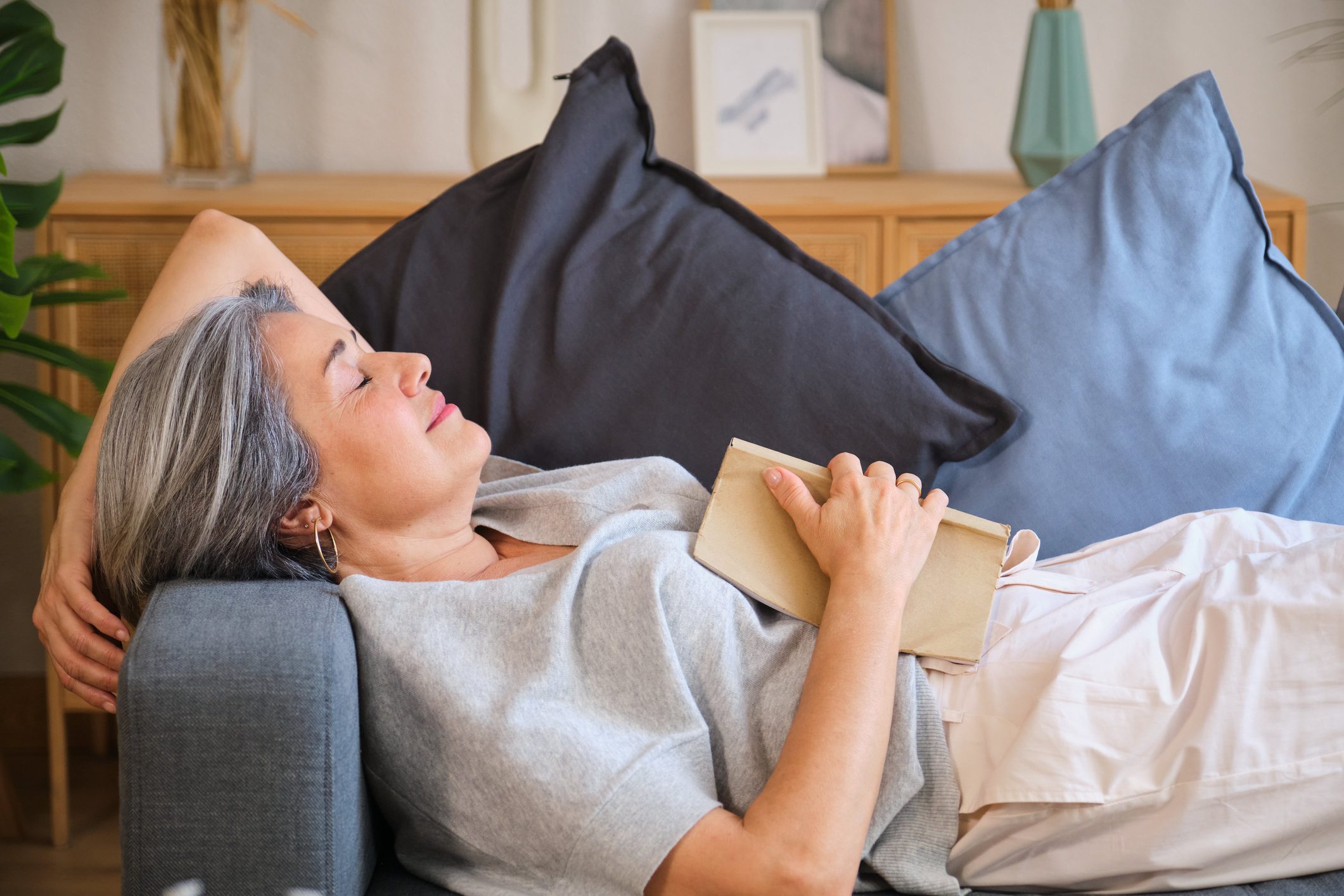Menopause brings numerous changes to your body, from hot flashes and night sweats to mood swings and weight fluctuations. Among these shifts, sleep disturbances can be particularly frustrating. As your hormone levels fluctuate, you might toss and turn at night, struggle to fall asleep, or wake up multiple times a night. These sleep issues can worsen other menopausal symptoms, leaving you feeling exhausted and irritable during the day.1, 2
You’re not alone in facing these challenges. Sleep problems affect 40-60% of women during menopause, with research indicating an increased likelihood of sleep disturbances during this transition.3
The Impact of Sleep Issues During Menopause
Sleep issues during menopause primarily stem from hormonal fluctuations, particularly a drop in estrogen. This hormone plays a key role in regulating body temperature, promoting sleep-related chemicals in the brain, and keeping throat muscles toned to maintain open airways. Lower estrogen levels can lead to insomnia, sleep apnea, and restless leg syndrome, which can all make it harder to get restful sleep.4, 5
These hormone-driven sleep disturbances can create a domino effect on your health. Poor sleep increases the risk of serious conditions like heart disease, diabetes, and obesity, while also exacerbating mood disorders such as depression and anxiety. Additionally, disrupted sleep can further impair hormonal balance, leading to heightened stress, increased hunger, and weight gain. Common menopausal symptoms like night sweats and hot flashes can add to the struggle, creating a challenging cycle.6-9
Altogether, it may feel like a vicious cycle with no way out, but with the right strategies, you can cultivate great sleep during this transition.
5 Ways to Improve Sleep During Menopause
1. Eat by the Plate
Embrace the trifecta of protein, healthy fats, and fiber—what I call eating by the plate. Aim for 30-50g of protein per meal, as it helps boost the production of sleep-promoting hormones like serotonin and melatonin, essential for a healthy sleep cycle.
Healthy fats, fiber, and slow-digesting carbs further support restful sleep by balancing blood sugar and promoting neurotransmitter production.10-13
Consider phytoestrogen-rich foods as well, which can mimic the effects of estrogen in your body and alleviate menopausal symptoms. Great options include adding ground flaxseed to your loaded smoothies (try my Hot Flash-Halting Protein Shake) and incorporating garbanzo beans in recipes like this Chickpea Falafel Salad with Tahini Dressing.14

2. Maintain Regular Exercise
Regular exercise is a powerful tool for improving sleep quality during menopause. It helps regulate your natural sleep-wake cycle and combats stress and anxiety by releasing feel-good endorphins. Research shows that exercise can significantly reduce the severity of insomnia and alleviate sleep problems in menopausal women.
Resistance training, in particular, promotes deeper, more restorative sleep. Pairing consistent strength exercises with an after-dinner walk can aid digestion and relaxation, setting the stage for a good night’s sleep.15, 16
Timing is key for maximizing the sleep benefits of exercise. Just as you should close the kitchen three hours before bedtime, aim to avoid intense workouts within two to three hours of sleep as well to prevent difficulty falling asleep.
3. Optimize Your Sleep Environment
Creating an ideal sleep environment is key to improving your sleep quality during menopause. Start by maintaining a cool bedroom temperature (65°-68°F), ensuring complete darkness, and using comfortable, breathable bedding. Establishing a consistent sleep schedule and developing a calming pre-sleep routine can signal your body that it’s time to wind down.
Sleep&Glow creates cutting-edge sleep products that boost both sleep quality and beauty. Their signature Omnia pillow helps prevent sleep wrinkles and reduces morning puffiness, while their blankets, loungewear, and supplements support different aspects of restful sleep. By blending ergonomic design with sleep-enhancing materials, Sleep&Glow is dedicated to improving sleep and overall wellness. Shop Sleep&Glow and use code jjvirgin for $20 off pillows and blankets.*
Consider incorporating sleep-support supplements into your nighttime routine. Melatonin, a hormone naturally produced by your body, can help you fall asleep faster and enhance sleep quality. For added benefits, look for high-quality supplements that combine melatonin with other calming nutrients.
Finally, limit screen time for at least an hour before bed to avoid blue light interference with your sleep-wake cycle. If you must use screens, blue-blocking glasses like these True Dark blue light glasses can be a helpful tool to reduce your exposure at night. (Get 10% OFF with code JJ10.)*
4. Manage Stress
Stress can be a major roadblock to a good night’s sleep, especially during menopause. When stressed, your body releases cortisol, the “fight or flight” hormone, which keeps you alert and makes it hard to wind down. This heightened alertness can lead to racing thoughts, muscle tension, and restlessness, making falling asleep feel impossible. Plus, stress can exacerbate other menopause symptoms like hot flashes, mood swings, and weight gain.19, 20
To combat this, build a toolkit of stress-management techniques. Daily meditation or deep breathing exercises can promote relaxation and prepare your body for sleep. Research shows that meditation can help alleviate symptoms like mood swings and irritability linked to hormonal changes.21 Personally, I’ve found Dr. Joe Dispenza’s meditations to be a lifeline for better sleep. Additionally, keeping a gratitude journal can help shift your focus to the positive, reducing anxiety and fostering a calmer mindset.
5. Work With a Functional-Medicine Doctor
You don’t have to tackle sleep issues during menopause alone. A functional-medicine doctor can provide personalized solutions tailored to your needs. They may recommend hormone therapies, such as progesterone, to help regulate sleep and alleviate other menopausal symptoms.
Functional medicine takes a holistic approach, considering your overall health, lifestyle, and hormonal balance to develop a comprehensive treatment plan. Along with medical options, your doctor can assist in creating a customized sleep routine and recommend supplements, dietary changes, and exercise strategies to enhance your sleep during menopause. To find a practitioner in your area, visit the Institute for Functional Medicine.
Don’t Let Menopause Crash Your Sleep
Menopause can turn your nights into a frustrating cycle of tossing and turning. You might find yourself wide awake at 2 in the orning, watching the clock and wondering if you’ll ever get a good night’s sleep again. The consequences of poor sleep during this transition are significant, with hot flashes, night sweats, and hormonal changes keeping you awake. Just one night of inadequate rest can trigger stress hormones, worsening menopausal symptoms like weight gain, mood swings, and skin changes.
It’s time to take charge of your sleep and confidently navigate this new phase! In my Best Rest Sleep Cheat Sheet, I share seven game-changing strategies to help you achieve restorative sleep. You’ll learn to manage factors impacting sleep during menopause, create a power-down hour that suits your changing body, establish a calming pre-bed routine to combat nighttime anxiety and discover the best nutrients for deep, restful sleep.
With these tools, you can transform your bedroom into a sanctuary of rest and wake up feeling refreshed, ready to embrace each day of this new chapter in your life.
Get your FREE Best Rest Sleep Cheat Sheet here.
References:
- Cleveland Clinic: Menopause: What It Is, Age, Stages, Signs & Side Effects
- National Institute on Aging: Sleep Problems and Menopause: What Can I Do?
- Baker FC, Lampio L, Saaresranta T, Polo-Kantola P. Sleep and Sleep Disorders in the Menopausal Transition. Sleep Med Clin. 2018 Sep;13(3):443-456. doi: 10.1016/j.jsmc.2018.04.011. PMID: 30098758; PMCID: PMC6092036.
- Lee J, Han Y, Cho HH, Kim MR. Sleep Disorders and Menopause. J Menopausal Med. 2019 Aug;25(2):83-87. doi: 10.6118/jmm.19192. Epub 2019 Aug 5. Erratum in: J Menopausal Med. 2019 Dec;25(3):172. doi: 10.6118/jmm.19192.err. PMID: 31497577; PMCID: PMC6718648.
- Sleep Foundation: How Can Menopause Affect Sleep?
- Salari N, Hasheminezhad R, Hosseinian-Far A, Rasoulpoor S, Assefi M, Nankali S, Nankali A, Mohammadi M. Global prevalence of sleep disorders during menopause: a meta-analysis. Sleep Breath. 2023 Oct;27(5):1883-1897. doi: 10.1007/s11325-023-02793-5. Epub 2023 Mar 9. PMID: 36892796; PMCID: PMC9996569.
- Zhang F, Cheng L. Association between sleep duration and depression in menopausal women: a population-based study. Front Endocrinol (Lausanne). 2024 Feb 19;15:1301775. doi: 10.3389/fendo.2024.1301775. PMID: 38440789; PMCID: PMC10910023.
- Kravitz HM, Kazlauskaite R, Joffe H. Sleep, Health, and Metabolism in Midlife Women and Menopause: Food for Thought. Obstet Gynecol Clin North Am. 2018 Dec;45(4):679-694. doi: 10.1016/j.ogc.2018.07.008. Epub 2018 Oct 25. PMID: 30401550; PMCID: PMC6338227.
- National Institute on Aging: Sleep Problems and Menopause: What Can I Do?
- Sutanto CN, Loh WW, Toh DWK, Lee DPS, Kim JE. Association Between Dietary Protein Intake and Sleep Quality in Middle-Aged and Older Adults in Singapore. Front Nutr. 2022 Mar 9;9:832341. doi: 10.3389/fnut.2022.832341. PMID: 35356724; PMCID: PMC8959711.
- Medical News Today: Eat more healthy fat to reduce the risk of type 2 diabetes
- Healthline: 14 Easy Ways to Lower Blood Sugar Levels Naturally
- Christianson, Alan. The Adrenal Reset Diet. Harmony/Rodale. Kindle Edition.
- Healthline: 10 Foods Rich in Phytoestrogens (Dietary Estrogen)
- Qian J, Sun S, Wang M, Sun Y, Sun X, Jevitt C, Yu X. The effect of exercise intervention on improving sleep in menopausal women: a systematic review and meta-analysis. Front Med (Lausanne). 2023 Apr 25;10:1092294. doi: 10.3389/fmed.2023.1092294. PMID: 37181372; PMCID: PMC10167708.
- Psychology Today: Want to Sleep Better? Go for a Walk
- The National Council on Aging: Sleep Environment: Why Is It Important?
- National Center for Complementary and Integrative Health: Melatonin: What You Need To Know | NCCIH
- Sleep Foundation: How Can Menopause Affect Sleep?
- WebMD: The Emotional Roller Coaster of Menopause
- Sung MK, Lee US, Ha NH, Koh E, Yang HJ. A potential association of meditation with menopausal symptoms and blood chemistry in healthy women: A pilot cross-sectional study. Medicine (Baltimore). 2020 Sep 4;99(36):e22048. doi: 10.1097/MD.0000000000022048. PMID: 32899065; PMCID: PMC7478772.
These statements have not been evaluated by the Food & Drug Administration. Products mentioned are not intended to diagnose, treat, cure, or prevent any disease. The views in this blog by JJ Virgin should never be used as a substitute for professional medical advice. Please work with a healthcare practitioner concerning any medical problem or concern.
*I couldn’t make it without supportive relationships, and I bet you feel the same! That’s why my team and I offer you products and services we believe in. If you happen to purchase something I recommend here, I may receive some kind of compensation. However, I only bring you partners whose content and core values will serve you with the same commitment to excellence my team and I strive for every day. Please be in touch with any concerns.




